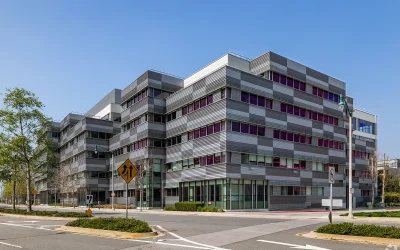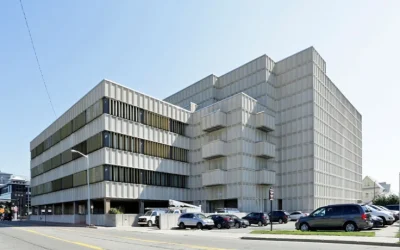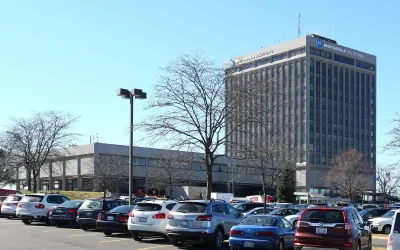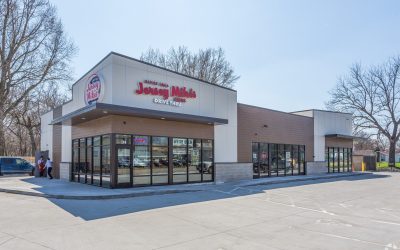In the News
First Brands files for bankruptcy, revealing billions of dollars in liabilities
First Brands, a U.S. auto-parts maker, filed for Chapter 11 bankruptcy with at least $10 billion in liabilities and up to $10 billion in assets. The company secured $1.1 billion in financing to keep operating while restructuring. A $2 billion revenue-linked factoring deal is under scrutiny for contributing to its financial troubles, though the reorganization is not expected to disrupt global operations or supply chains.
US apartment rent growth flattens in July
U.S. apartment rent growth stalled in July, with more than half of the 50 largest multifamily markets seeing month-to-month declines. The national average rent held steady at $1,717, marking the sixth straight month of flat or negative growth, while annual growth slowed to 1.1% from 1.5% in January.The slowdown is driven by higher supply and softening seasonal demand, which typically peaks in summer. Regionally, the Midwest and Northeast led with modest gains, while the South and West posted declines, especially in markets facing heavy new construction.San Francisco, Chicago, and San Jose topped annual growth, while Austin, Denver, and Phoenix led in annual declines. This reflects a growing divide between Midwest/coastal markets that remain resilient and Sun Belt markets where supply is outpacing demand.
The Fed is starting to worry about the housing market now
The Federal Reserve’s latest meeting minutes revealed new concerns about the housing market, which has been dragging down economic momentum. Policymakers noted weakening demand, falling prices, and declining building permits—raising worries that housing could become a broader risk to jobs and growth. While the Fed also flagged risks from tariffs, the labor market, and AI’s impact on employment, the housing slowdown stood out as a new focus. Fresh data confirmed the slump, with flat home sales, subdued prices, and low builder confidence, suggesting housing activity will likely soften further. This shift could influence upcoming rate decisions, with Chair Jerome Powell hinting at a possible September rate cut.
Florida now permanently exempting sales tax on everything from batteries to bike helmets
Dave Berman Florida Today Summary: Starting August 1, 2025, Florida now offers a permanent sales tax exemption on items like batteries, bike helmets, sunscreen, generators, and life jackets. These were previously only tax-free during disaster-prep holidays. The change...
Port Charlotte’s Sunseeker resort sold for $200 million
Allegiant sold the Sunseeker Resort Charlotte Harbor to Blackstone for \$200 million, aiming to refocus on its airline business. The \$695M resort faced delays and losses but recently improved, attracting Blackstone’s investment. The sale closes in Q3.
Developers use branded condos to finance luxury hotels as some lenders back off
Luxury labels like Mercedes-Benz, Dolce & Gabbana and Baccarat now lend their names to condo projects, letting developers pre-sell “branded residences” to fund new five-star hotels at a time when banks are wary of hotel loans. Buyers pay a premium for the cachet and perceived quality, brands collect naming-rights fees, and developers secure cheaper capital—making these condos the financial linchpin for high-end hotel construction in hotspots such as South Florida and Dubai.
This bid for one of Boston’s largest office towers shows how the value hits keep coming
The One Lincoln St. office tower in Boston was sold for $400 million at a foreclosure auction, a sharp decline from its $1 billion valuation in 2022. The building’s previous owner, Fortis Property Group, struggled with high vacancy rates after losing State Street Corp. as a tenant. Despite attempts to lease space, including a deal with HarbourVest Partners, the tower remains less than half leased. This sale reflects a broader trend of declining office building values nationwide, as vacancy rates rise due to shifts in work patterns post-pandemic. The new owners, BDT Capital Partners and DivcoWest, plan to capitalize on recent renovations aimed at attracting tenants.
Georgia safari park named 1 of TIME’s World’s Greatest Places for 2025
The Georgia Safari Conservation Park in Madison has been named one of TIME’s World’s Greatest Places for 2025. Opened in 2024, the 530-acre park offers visitors the chance to see animals like giraffes, rhinos, and bison roaming freely in a natural, safari-like environment. The park also provides unique accommodations, including glamping tents and a private giraffe suite. Its impact on the local economy and its inclusivity, with wheelchair-friendly safari vehicles and lodging, were highlighted by TIME. The park is recognized for its conservation efforts, working with organizations to provide homes for animals displaced by disasters.
Blackstone real estate debt fund closes with $8 billion in commitments
Blackstone has closed its latest real estate debt fund, Blackstone Real Estate Debt Strategies V, with $8 billion in total capital commitments, making it one of the largest private commercial property lending sources globally. The fund has attracted significant investments, including $1.5 billion from the California Public Employees’ Retirement System (CalPERS), which saw a nearly 5% increase in value. Despite the challenging fundraising environment due to high interest rates, commercial real estate lending has performed well, with major private equity firms seeing a rebound in capital raises. Blackstone’s debt strategies primarily focus on commercial property mezzanine loans and debt securities. The firm now manages $77 billion in assets within its real estate debt funds.
US has now canceled about one in 10 active federal commercial real estate leases
The Trump administration has significantly accelerated its pace of terminating commercial real estate leases for federal agencies, with over 500 new lease cancellations since Friday, now covering all 50 states. This move, led by the Department of Government Efficiency (DOGE), aims to reduce government expenses, affecting around 10% of active federal leases. While many terminations are for leases that had reached their termination rights date, some are for agreements with years remaining. The rapid cancellations are causing disruptions in the commercial real estate market, with potential long-term effects on property owners, service providers, and competition. The initiative could also lead to higher rents and more difficulty financing future government leases.
Million-Dollar Homes Skyrocket in Miami, as Starter Properties Go Extinct
In Miami, the luxury housing market has surged as wealthy buyers push home prices to unprecedented levels, making entry-level homes increasingly scarce. Between 2019 and 2024, sales of single-family homes under $500,000 dropped by nearly 80%, while the market for homes priced between $500,000 and $1 million saw significant growth. High-end sales have skyrocketed, with the number of homes sold for over $10 million rising by 248% since 2019, and the luxury threshold for single-family homes now reaching $3.3 million. The shortage of affordable homes is exacerbated by limited inventory, high construction costs, and owners holding onto properties. Despite challenges like rising sea levels and insurance costs, Miami’s allure for the ultra-wealthy continues to drive the market upward.
Small Warehouses Are Getting Harder to Find
Half Price Books has been struggling to find a replacement for its 6,000-square-foot warehouse in the Minneapolis-St. Paul area for over a year due to a lack of small warehouse spaces. Despite a rise in overall warehouse availability, the vacancy rate for spaces under 100,000 square feet remains low at 3.9%, making it difficult for businesses needing smaller facilities. Developers have prioritized constructing larger warehouses over 100,000 square feet, leaving a gap in the market for smaller spaces. As a result, Half Price Books has resorted to temporary storage and is now considering alternative regions for warehouse space while seeking ways to optimize its storage needs.
Large deals push US commercial property prices higher
In the fourth quarter, U.S. commercial real estate prices improved for large-dollar deals in major markets, while smaller transactions in secondary markets either stabilized or slowed their decline. The increase in high-value deals was accompanied by rising transaction volumes, reaching a two-year high of 4,538 sales totaling $35.53 billion. Industrial property prices rose across both large and small markets, while other sectors showed mixed performance. Investment-grade sales, comprising 63% of the quarter’s deals, surged 25.1% year-over-year, with an average deal size of $7.44 million. Regionally, price trends were mixed, but overall conditions improved compared to previous quarters.
AT&T’s $850 million sale-leaseback deal serves as model for future transactions
AT&T has sold over 13 million square feet of underutilized real estate to Reign Capital for more than $850 million in a sale-leaseback deal. The transaction involves 74 central offices across 23 states, which were originally built for outdated copper networks but are now only 35% utilized due to the shift to fiber and wireless systems. This strategic move allows AT&T to streamline its real estate portfolio while maintaining operational control of necessary spaces and securing a share in future redevelopment revenues. The deal, which closed on January 8, 2025, is part of AT&T’s plan to exit most of its legacy copper network operations by 2029 and serves as a model for future real estate transactions.
Advance Auto Parts puts more than 200 stores on the market
Advance Auto Parts has engaged Hilco Real Estate to sell over 200 of its stores and leases across 46 states, as part of a strategy to downsize its physical footprint. This portfolio includes both owned properties and leased locations, which range in size from 3,000 to 48,000 square feet, and are situated in urban areas and strong commercial corridors. The move follows Advance Auto’s announcement in November to close more than 700 stores and four distribution centers to improve profitability amid declining sales. Hilco will market these properties for sale individually, together, or in combinations, with offers being accepted until March.
As wave of commercial loans comes due, concerns rise over tougher payment options
The commercial real estate market is facing a significant wave of loan maturities, with $8.6 billion in commercial mortgage-backed security (CMBS) loans due this month alone. This surge is expected to peak in October 2025, with nearly double the January amount coming due. While lenders have been lenient in granting extensions in recent years, there are growing concerns that loan servicers may adopt a tougher stance, potentially leading to an increase in foreclosures.
The largest chunk of debt coming due is from Blackstone affiliates, totaling over $3 billion. Many borrowers are seeking extensions, but industry professionals anticipate a shift towards other types of debt resolutions. Lower property valuations, particularly in the office sector, are complicating matters, with some appraisals coming in at 40% less than the outstanding loan amounts. This situation is prompting bondholders to consider alternative strategies, such as discounted loan payoffs or loan splitting, to mitigate potential losses.
Elon Musk-led Department of Government Efficiency pushes return of full workweek for federal workers
Elon Musk, co-leader of the newly formed Department of Government Efficiency, plans to enforce a full five-day workweek for all federal employees as part of efforts to slash government spending and regulations. Musk and fellow Trump administration adviser Vivek Ramaswamy argue that work-from-home policies are an expired “privilege” and that requiring in-office presence could lead to voluntary terminations, potentially reducing the federal bureaucracy by 25%. This initiative aligns with Musk’s commitment to cut at least $2 trillion from the annual U.S. budget and reduce the number of government agencies. However, the proposal faces opposition from government employee unions and may conflict with the federal government’s ongoing efforts to reduce its leased office space, particularly in Washington D.C., where office vacancy rates have reached record highs.
This Miami condo tower to use sun-absorbing glass to stand out
Miami developer Ytech has begun construction on The Residences at 1428 Brickell, an 860-foot luxury high-rise partially powered by solar energy through a “solar backbone” of 500 photovoltaic-integrated windows. This innovative 70-story tower will generate up to 175 megawatts of clean energy annually, reducing carbon emissions by 4,700 tons without relying on tax incentives. Featuring 195 fully furnished units priced from $3 million to $60 million, the project caters to Miami’s growing demand for larger, high-end condominiums. With over 50% of units presold, the building will include wellness-inspired amenities and is set to open in 2028, contributing to Miami’s status as a “vertical city.”
Blackstone to buy Jersey Mike’s, the latest private-equity takeover of a US restaurant chain
Blackstone, a major private equity firm, has agreed to acquire a majority stake in Jersey Mike’s Subs for around $8 billion, aiming to accelerate the sandwich chain’s expansion. Jersey Mike’s, the second-largest U.S. sandwich chain with over 3,000 locations, plans to leverage Blackstone’s expertise in growing franchise businesses to enhance U.S. and international growth, as well as invest in technology and digital transformation. Despite challenges in the restaurant industry, franchisors like Jersey Mike’s continue to attract investors due to their strong cash flow and growth potential. Founder and CEO Peter Cancro, who has led the company since 1975, will retain a significant stake and continue managing operations. The deal reflects Blackstone’s broader strategy of investing in high-growth franchises, adding to its recent acquisitions in the dining and hospitality sectors. Completion is expected in early 2024.
Analysts: Charlotte County’s rapid population growth calls for more services
Charlotte County’s population increased 5.2% from June 2023 to March 2024. During a Nov. 12 Board of County Commissioners meeting, analysts recommended steps to be considered to prepare as approximately 40,000 more people are projected to call the county home by 2030. “We have 212,000 people as of March of this year, and by 2030, we think you’re going to be close to 252,000 people,” David Farmer, CEO of county-contracted Metro Forecasting Models, told commissioners. He made the presentation using the Interactive Growth Model analytical tool that shows the county is on pace to permit 4,400 units by the end of the year. He said the increasing population causes a deterioration of the level of services of the county’s facilities, adding that the county “had 15,000 people show up” over 18 months.
Washington Post joins corporate America in return of five-day office mandate
The Washington Post has announced a return to a five-day in-office workweek starting next year, ending its remote and hybrid policies established during the pandemic. Publisher Will Lewis emphasized the importance of in-person collaboration, stating that the company thrives on “great office energy.” Managers are required to return by February 3, 2025, while all other employees will follow by June 2. This shift aligns with similar policies from major companies like Amazon, which also recently mandated full-time office attendance. The move has faced criticism from the Washington Post Guild, which argues that it may disrupt productivity rather than enhance it.
Here are six notable housing-related measures voters decided this week
Voters across several states and cities made significant decisions regarding housing and property taxes during the recent Election Day. In Charlotte, North Carolina, residents approved a $100 million bond for affordable housing and an additional $62 million for neighborhood enhancements. Meanwhile, North Dakota voters rejected a proposal to change local funding structures for public services, and Arizona passed a measure allowing homeowners to seek tax refunds if local governments fail to address nuisances associated with homelessness. Additionally, Rhode Island voters approved a $120 million allocation for affordable housing, while Florida homeowners supported an amendment to adjust property tax exemptions annually for inflation. In Denver, however, a proposed $100 million bond for affordable housing did not gain enough support.
Bosses Are Calling Workers Back to the Office. That’s Good News for Landlords.
The U.S. office market shows signs of stabilizing as more companies, including Amazon and Dell, call employees back to the office, with one-third of firms now requiring in-office attendance five days a week. This shift has benefited landlords, particularly as newer, amenity-rich spaces attract higher occupancy. Although office vacancies remain high, at 13.8%, and distressed office loans are rising, the demand for well-located and modern properties is improving. Some firms, like HSBC, report increased attendance in newly upgraded spaces, while investor interest in distressed properties is also growing amid a modest recovery in the sector.
Southwest Florida Witnesses Record-Breaking Industrial Sale
McGarvey Development Company, a comprehensive construction and real estate firm, sold Centerlinks Business, which includes nine industrial warehouses. Totaling 453,940 square feet on 41 acres, the park is located at 16770 Oriole Road in Fort Myers. The business park sold for $92.5 million. The property was purchased by EQT Exeter, a company with over 30 years in the industry and a portfolio exceeding $30 billion in managed real estate assets. The private equity company has now broken Lee County’s industrial sales record.
Hurricane Milton’s commercial property threat; Government mulls Google breakup; Strike brings light toll on ports
Hurricane Milton threatened over $1 trillion worth of commercial property in Florida, with more than 235,000 properties at risk of exposure to dangerous winds. The storm’s path included 44,122 industrial spaces, 78,916 retail properties, 42,387 office buildings, 64,857 apartment buildings, and 5,056 hotels. While initial worst-case estimates projected up to $175 billion in losses, the actual damage was less severe, with preliminary estimates forecasting losses and cleanup costs of $75 billion. The storm’s impact was particularly significant for the lodging sector, with many hotels forced to shut down temporarily and offer free cancellations.
























